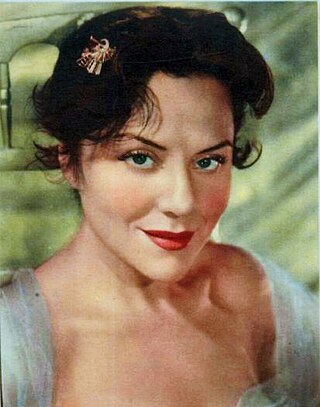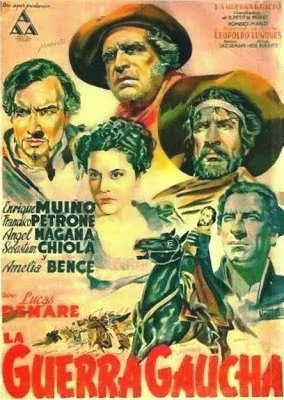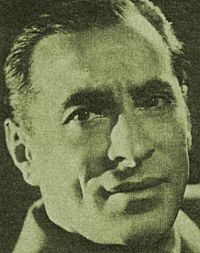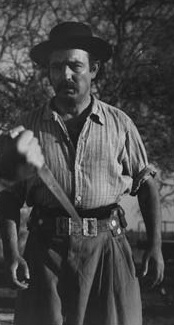History
Pampa Film was founded in January 1937 by Warner Bros. in partnership with the local entrepreneur Olegario Ferrando. The company used the Lumiton facilities at first, and Lumiton was to distribute its films. Later the link with Lumiton was severed.
Luis Saslavsky directed Sueño de Una Vide Nueva for Pampa Film, released in Argentina as La fuga by Warner Bros. on 28 July 1937 with music by César Gola. It was one of the hits of the year. Jorge Luis Borges praised the romantic comedy, saying it did not "suffer from fruitless images" but flowed "the way American films do." In La fuga Amelia Bence supported Tita Merello and Santiago Arrieta. Her performance earned Bence a contract at Pampa Film and three other film appearances.
On 17 August 1939 Pampa Film released Prisioneros de la tierra , directed by Mario Soffici and starring Ángel Magaña, Francisco Petrone, Eliza Gálvez, Raúl Lange, Homero Cárpena and Roberto Fugazot. The highly successful film, based on short stories by Horacio Quiroga, has become a classic. The Argentine film historian Domingo di Núbila has called the genre launched by this film "social folkloric". It inspired many later filmmakers in Argentina, although in the short term the industry did not take up the challenge.

Amelia Bence was an Argentine film actress and one of the divas of the Golden Age of Argentine cinema during the 1930s and 1950s.

Mecha Ortiz was an Argentine actress who appeared in films between 1937 and 1981, during the Golden Age of Argentine cinema. At the 1944 Argentine Film Critics Association Awards, Ortiz won the Silver Condor Award for Best Actress for her performance in Safo, historia de una pasión (1943), and won it again in 1946 for her performance in El canto del cisne (1945). She was known as the Argentine Greta Garbo and for playing mysterious characters, who suffered by past misfortunes in love, mental disorders, or forbidden love. Safo, historia de una pasión was the first erotic Argentine film, though there was no nudity. She also played in the first film in which a woman struck a man and the first film with a lesbian romance. In 1981, she was awarded the Grand Prize for actresses from the National Endowment for the Arts.

Mario Soffici was an Italian-born Argentine film director, actor and screenwriter notable for his work during the Golden Age of Argentine cinema.

Pierre Bruno Hugo Fontana, otherwise known as Hugo del Carril, was an Argentine film actor, film director and tango singer of the Golden Age of Argentine cinema.

Manuel Romeo was an Argentine film director, screenwriter, dramatist and score composer, one of the most important figures of the Golden Age of Argentine cinema. He directed and wrote over 50 films between 1931 and 1951 even composing the musical scores for several.

Aída Alberti was an Argentine film actress of the Golden Age of Argentine cinema.

Prisoners of the Earth, also known as Prisoners of the Land, is a 1939 Argentine drama film directed by Mario Soffici, one of the most celebrated films of the Golden Age of Argentine cinema. The film premiered in Buenos Aires. The film is often cited as one of the greatest in the history of Argentine cinema, and established Soffici as a "social" filmmaker. It was awarded by the Municipality of Buenos Aires as the best film of the year, and the Silver Condor Award instituted by the Argentine Association of Film Critics.

The Gaucho War is a 1942 Argentine historical drama and epic film directed by Lucas Demare and starring Enrique Muiño, Francisco Petrone, Ángel Magaña, and Amelia Bence. It is one of the most celebrated works of the Golden Age of Argentine cinema. The film's script, written by Homero Manzi and Ulyses Petit de Murat, is based on the novel by Leopoldo Lugones published in 1905. The film premiered in Buenos Aires on November 20, 1942 and is considered by critics of Argentine cinema to be one of the most successful films in history.

Francisco Petrone was an Argentine film actor, notable for his work during the Golden Age of Argentine cinema. He is best known for his roles in the 1940s in the classic film La Guerra Gaucha (1942) and A Real Man (1943), for which he won the Silver Condor Award for Best Actor at the 1944 Argentine Film Critics Association Awards.

Ángel Magaña was an Argentine film actor of the Golden Age of Argentine cinema during the 1930s, 1940s and 1950s.
Ralph Pappier was an Argentine production designer, set decorator and film director.

Lumiton is a former film production company and current museum located in Munro, Buenos Aires, Argentina. Lumiton Studios was founded in 1932 at the start of the Golden Age of Argentine cinema. Its lowbrow, populist films appealed to local audiences and were highly successful in Argentina and throughout Latin America. It was the main competitor to Argentina Sono Film in the 1940s.

The Englishman of the Bones is a 1940 Argentine melodrama film of the Golden Age of Argentine cinema directed and written by Carlos Hugo Christensen, based on a novel of the same name by Benito Lynch.
The Golden Age of Argentine cinema, sometimes known interchangeably as the broader classical or classical-industrial period, is an era in the history of the cinema of Argentina that began in the 1930s and lasted until the 1940s or 1950s, depending on the definition, during which national film production underwent a process of industrialization and standardization that involved the emergence of mass production, the establishment of the studio, genre and star systems, and the adoption of the institutional mode of representation (MRI) that was mainly—though not exclusively—spread by Hollywood, quickly becoming one of the most popular film industries across Latin America and the Spanish-speaking world.

Sebastián Chiola was an Argentine film actor. In 1945 he won the Silver Condor Award for Best Supporting Actor for his performance in the thriller The Corpse Breaks a Date (1944).

Amanda Varela was an Argentine actress who primarily worked during the Golden Age of Argentine Cinema, performing on stage and in films of Argentina and the US. She made 9 films in Argentina and 2 in the US and appeared on stage in numerous productions in both countries. Varela is usually credited with helping her sister, Mecha Ortiz, secure her first acting roles. In the 1950s, Varela retired from acting, moved to the United States, and became a matrimonial judge.

Florencio Parravicini was an Argentine actor who primarily worked during the Golden Age of Argentine Cinema, performing on both stage and in films. From an aristocratic family, he was a relative of the artist Benjamín Solari Parravicini (1898-1974). He began his career singing música criolla, a Latino folk genre of music that exists in many countries throughout Latin America. He appeared in more than three hundred theatrical works and films, becoming one of the leading figures of Argentine entertainment. Facing cancer, Parravicini committed suicide in 1941.

Estudios San Miguel was an Argentine film studio that was active in the 1940s and early 1950s. It flourished during the Golden Age of Argentine cinema, and at its peak was one of the major studios in Buenos Aires. Genres ranged from musical comedy to costume drama and gaucho thriller. Films included La guerra gaucha, co-produced with Artistas Argentinos Asociados, and the comedy Juvenilia (1943), both of which won several major awards. Eva Duarte, soon to become the first lady of Argentina as Eva Perón, appeared in two of the studio's films in 1945. The studio became overextended financially and ceased production after 1952.

Raúl del Valle was a Chilean film and theatre actor who performed for most of his career in Argentina.















